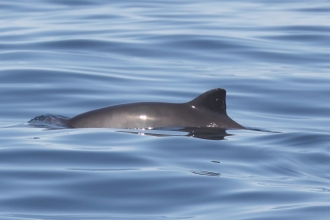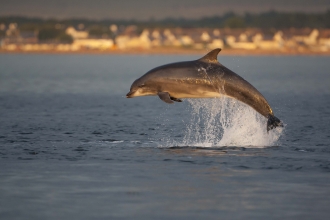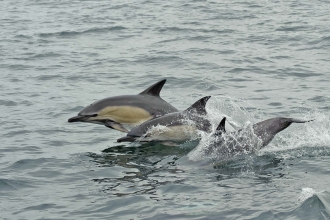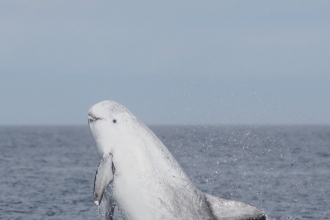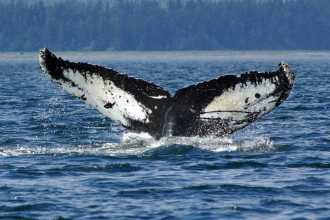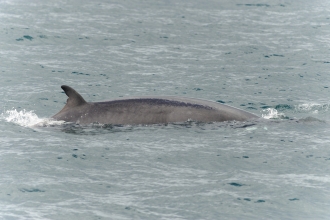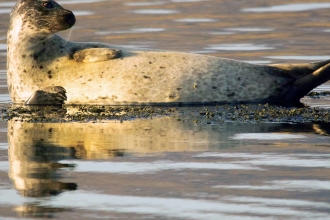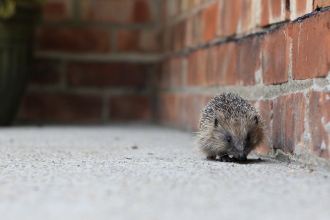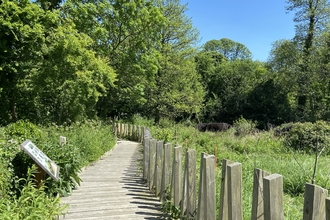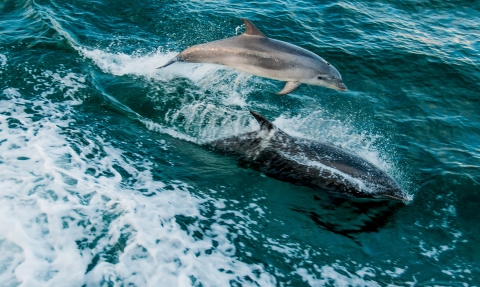
Bottlenose dolphins © Stewart Canham
Dorset Dolphins
Discover Dorset's dolphins
Around twenty-eight species of whales, dolphins, and porpoises (collectively known as cetaceans) are recorded along the UK coastline. A number of these have been recorded in Dorset from the diminutive and shy harbour porpoise to a magnificent fin whale – the second largest animal in the world! Bottlenose dolphins are the species most frequently observed in Dorset. These robust dolphins tend to spend more time inshore than other species, making them easier to spot from the land as well as from the sea.
Did you know that England’s only resident pod of bottlenose dolphins are found along the South Coast, regularly travelling between Cornwall and Sussex? By studying photos of their dorsal fins, researchers have identified that the group consists of around 40 individuals making them the UK’s smallest population. The South Coast Bottlenose Dolphin Consortium are collecting sightings and photos to try and learn more about this important, yet vulnerable population. Please report sightings of bottlenose dolphins to: SCbottlenosedolphins@outlook.com
Other species spotted in Dorset include short-beaked common dolphin, white-beaked dolphins, Risso’s dolphin and even the occasional whale. Click on the links below to learn more about each of these species.
Tips for spotting dolphins
Grab yourself a pair of binoculars and find a suitable lookout. Headlands provide an excellent vantage point but make sure you keep well back from any cliff edges. Scan the sea and look for their distinctive dorsal fins or other signs of activity such as breaching (jumping clear of the water) or bow-riding passing vessels. Another sign to keep an eye out for is circling or diving sea birds, indicating that dolphins may be feeding below, herding fish towards the surface.
Wildlife watching boat tours are a great way to see the coast and spot wildlife. Make sure you choose a responsible or WiSe accredited operator if possible: https://www.wisescheme.org/
If you have spotted a whale or dolphin in Dorset, please let us know by tagging us in your tweets (@DWTMarine) or by emailing: kimmeridge@dorsetwildlifetrust.org.uk
Watch responsibly
To see a whale or dolphin can evoke such emotion and create memories that will stay with you forever.
All cetaceans are protected from disturbance and harm by law. Follow the advice provided in the Marine and Coastal wildlife code to find out what disturbance looks like and how to avoid causing it.
If you encounter a cetacean when you’re on the water, you should:
- Slow down and keep speed below six knots (no-wake speed).
- Stay at least 100 metres away and slowly move further away if you notice signs of disturbance.
- Keep your distance if there are already more than two boats or watercraft in the vicinity.
- Never encircle or chase animals.
- Never try to swim with, touch or feed them.
Sometimes the animals may choose to approach you, in this situation you should maintain a steady speed and direction and let the animals leave when they choose.
Live strandings
Occasionally cetaceans may beach themselves through confusion, fear, or ill health. If you find a live stranded cetacean, call the British Divers Marine Life Rescue hotline immediately on 01825 765546.
Do not try to return them to the water – you will be risking the health and safety of both the cetacean and yourself.
Dead cetaceans
Whilst it is sad to see a dead dolphin washed up on the beach it’s still important to report these strandings. Please let us know or report directly to the Cetacean Strandings Investigation Programme (CSIP) on 0800 652 0333.
This information offers a glimpse into the health of our local seas. It can also help to provide a better understanding of what species are found around the UK and their distribution. In some cases, the carcass will be retrieved by CSIP so that they can carry out further examinations to try and identify any factors that may have contributed to its death.
Please remember, all cetaceans can carry harmful diseases which could be transmitted to us when they are alive or dead. Make sure you remain at a safe distance and keep dogs on leads.
Solitary dolphins
Occasionally, dolphins may become separated from their pod or choose to lead a more solitary lifestyle. In recent years, several solitary bottlenose dolphins have been observed in Dorset. Unfortunately, this way of life can often lead them to becoming habituated as they seek out interaction with people and boats, putting them at risk of harmful situations.

